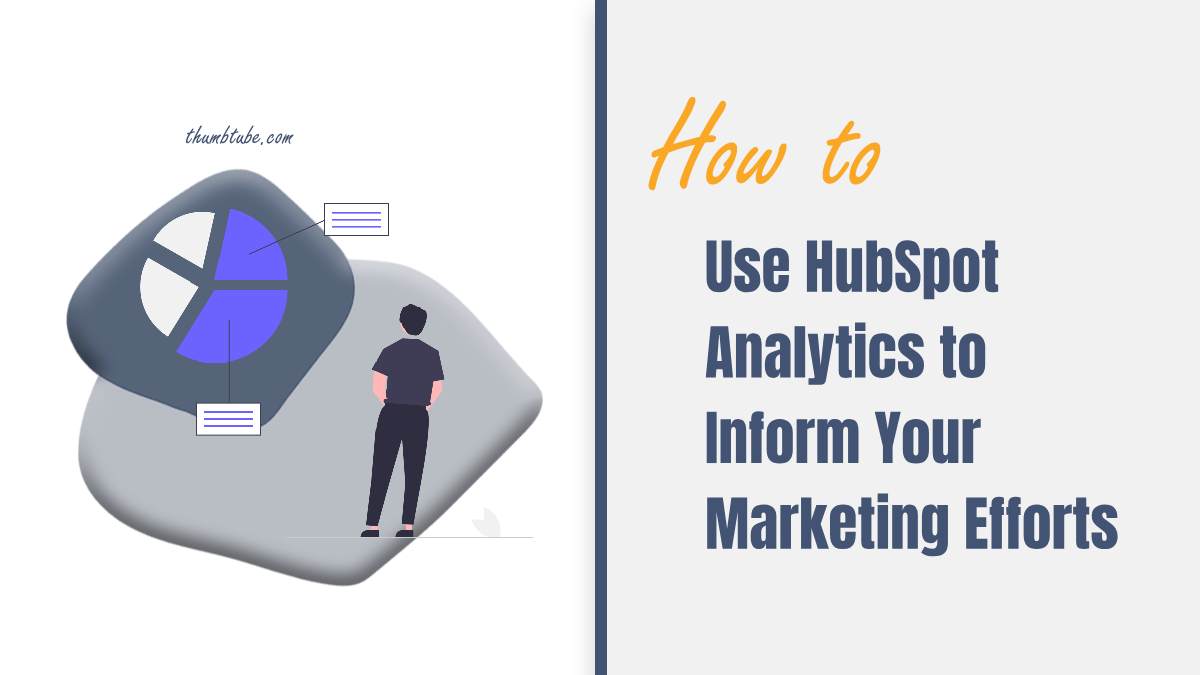In today’s digital age, data-driven marketing has become a cornerstone of successful marketing strategies. Understanding your audience, tracking your marketing efforts, and making data-informed decisions can significantly impact the effectiveness of your campaigns. HubSpot, a leading marketing automation platform, offers a robust set of analytics tools to help marketers gain valuable insights into their efforts. In this article, we’ll explore how to use HubSpot Analytics to inform and improve your marketing strategies.

Understanding HubSpot Analytics
HubSpot Analytics is a comprehensive tool that provides data and insights across various aspects of your marketing activities, including website traffic, email marketing, social media, and lead generation. It allows you to track key performance indicators (KPIs), measure the impact of your marketing efforts, and make data-backed decisions.
Setting Up HubSpot Analytics
Before you can start using HubSpot Analytics, you’ll need to set up your HubSpot account and integrate it with your website and other marketing channels. Here are the steps to get started:
1. Create a HubSpot Account: Sign up for a HubSpot account if you haven’t already. HubSpot offers various pricing plans, including a free version with basic analytics features.
2. Integrate Your Website: To track website performance, you’ll need to integrate HubSpot with your website. This typically involves adding a tracking code snippet to your website’s HTML.
3. Connect Other Marketing Channels: Integrate your email marketing, social media, and other marketing channels with HubSpot to centralize your data and gain a holistic view of your marketing efforts.
4. Define Your Goals: Clearly define your marketing goals and objectives. Having specific goals in mind will help you set up relevant tracking and reporting in HubSpot.
Key Features of HubSpot Analytics
HubSpot Analytics offers a wide range of features and tools to help you analyze and optimize your marketing efforts. Here are some key features:
1. Dashboard
HubSpot’s dashboard provides an at-a-glance view of your most important KPIs. You can customize your dashboard to display metrics such as website traffic, conversion rates, email open rates, and more.
2. Reports
HubSpot offers a variety of pre-built reports and dashboards, including website analytics, email performance, and social media engagement. You can also create custom reports tailored to your specific needs.
3. Traffic Analytics
Track and analyze website traffic by source, channel, and device. HubSpot’s traffic analytics helps you understand where your visitors are coming from and which channels are driving the most traffic.
4. Conversion Tracking
Monitor the performance of your conversion paths and forms. You can see how well your landing pages and forms are converting visitors into leads, and identify areas for improvement.
5. Email Marketing Analytics
Gain insights into your email marketing campaigns by tracking open rates, click-through rates, and engagement metrics. HubSpot’s email analytics helps you optimize your email content and strategies.
6. Social Media Analytics
Track the performance of your social media posts and campaigns. You can measure engagement, follower growth, and the impact of your social media efforts on website traffic and conversions.
7. Lead Generation Analytics
Understand the effectiveness of your lead generation efforts by tracking the sources of your leads and their conversion paths. This data helps you allocate resources to the most productive lead-generation channels.
8. Sales Analytics
For sales teams, HubSpot offers sales analytics tools to track pipeline performance, deal progression, and sales team productivity. This information can help sales teams prioritize leads and close deals more effectively.

Using HubSpot Analytics to Inform Your Marketing Efforts
Now that you’re familiar with the features of HubSpot Analytics, let’s discuss how to use this tool to inform your marketing strategies:
1. Data Review and Benchmarking
Start by reviewing your existing data to establish benchmarks for your KPIs. Understand your current performance levels across different marketing channels and identify areas that need improvement.
2. Goal Setting
Set clear and specific goals for your marketing campaigns. Whether it’s increasing website traffic, improving email open rates, or boosting lead generation, having well-defined objectives will guide your efforts.
3. Regular Monitoring
Continuously monitor your analytics data. HubSpot provides real-time and historical data, allowing you to track trends and identify anomalies. Regular monitoring helps you react quickly to changes in performance.
4. Segmentation
Use HubSpot’s segmentation capabilities to group your audience based on various criteria, such as demographics, behavior, or engagement. Segmented data can provide insights into which audience segments are most responsive to your campaigns.
5. A/B Testing
Leverage A/B testing to experiment with different marketing strategies, such as email subject lines, website design elements, or ad copy. HubSpot allows you to track the performance of these tests and choose the most effective approach.
6. Optimization
Based on your data analysis, make data-informed decisions to optimize your marketing efforts. Adjust your strategies, content, and targeting to improve your KPIs and achieve your goals.
7. Reporting
Generate and share reports with your team or stakeholders to keep them informed about your marketing performance. HubSpot’s reporting tools make it easy to create custom reports tailored to your audience’s needs.
8. Continuous Learning
Stay up-to-date with the latest features and best practices in HubSpot Analytics. HubSpot offers a wealth of resources, including webinars, documentation, and community forums, to help you make the most of the platform.
HubSpot Analytics is a powerful tool that can provide valuable insights into your marketing efforts. By setting up, using, and interpreting the data from HubSpot Analytics, you can make informed decisions, optimize your strategies, and drive better results in your marketing campaigns. Whether you’re a small business owner, a marketing professional, or part of a larger marketing team, leveraging HubSpot Analytics can significantly enhance your marketing game and help you achieve your goals.
